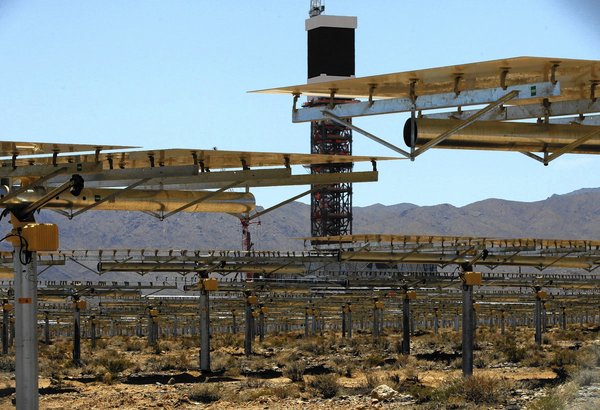forum
library
tutorial
contact

Obama Flies to the Nevada
Desert to Promote Solar Energy
by Gardiner Harris
New York Times, August 24, 2015
|
the film forum library tutorial contact |

|
Obama Flies to the Nevada
by Gardiner Harris
|
Solar is going big. Again.
 LAS VEGAS -- President Obama flew west into the blistering sun of this desert oasis on Monday not so much to issue a dour warning about the dangers of climate change -- moralizing does not become this freewheeling city -- but to speak with great hope about solar and other renewable forms of energy.
LAS VEGAS -- President Obama flew west into the blistering sun of this desert oasis on Monday not so much to issue a dour warning about the dangers of climate change -- moralizing does not become this freewheeling city -- but to speak with great hope about solar and other renewable forms of energy.
"We're here today because we believe that no challenge poses a greater threat to our future than climate change," Mr. Obama said. "But we're also here because we hold another belief, and that is, we are deeply optimistic about American ingenuity."
While promoting the benefits of all renewable energy, including wind power, the president focused largely on solar energy, part of an increasingly intense effort to counter global warming by instituting policies to reshape the nation's energy industry.
"I noticed you got a lot of sun around here," he said in the speech, and he noted that the "solar industry now employs twice as many Americans as mining coal."
The speech, at the National Clean Energy Summit, came as his administration announced a series of measures to encourage solar power construction, including making an additional $1 billion in loan guarantee authority available in a federal program for innovative versions of residential rooftop solar systems.
But none of the measures would have as great an impact on the solar industry as the Clean Power Plan, which requires states to cut carbon emissions by an average of 32 percent. That plan, announced this month, provides incentives for much of those reductions to come from renewable energy projects -- exactly what executives at the conference are looking to sell.
As part of his efforts on climate change, Mr. Obama will fly to New Orleans on Thursday to note the 10th anniversary of Hurricane Katrina and talk about how to protect cities against global warming's effects. Next week, he will become the first sitting president to visit the Arctic Circle in Alaska, and next month he will host Pope Francis at the White House to talk, in part, about the moral dimensions of the problem.
With the nation's electrical needs growing only modestly, executives in the renewable power industry are depending on electric utilities to retire their aging coal-fired power plants and replace them with renewable power sources. The administration's power plan is expected to accelerate that process.
Solar power, though, still provides less than 1 percent of the electricity generated in the United States. In 2014, renewable energy sources provided 13 percent of the nation's electricity -- about half of which came from hydroelectric dams, a third from wind and 3 percent from solar, according to federal data.
But the price of solar power dropped 78 percent from 2009 to 2014, while the price of wind power dropped 58 percent. Wind is now among the cheapest sources of power in the United States, with solar not far behind.
Mr. Obama said that Walmart, Google and Apple were among the largest purchasers of clean energy and installers of clean energy systems in the world. "For decades, we've been told that it doesn't make economic sense to switch to renewable energy," Mr. Obama said. "Today, that's no longer true."
Mr. Obama said that the nation's quick move toward renewable energy was creating "resistance from some fossil fuel interests." He mentioned Charles G. and David H. Koch of Koch Industries, among others, as people who like to promote free-market ideology, except when it comes to clean energy.
Representative Rob Bishop, Republican of Utah and the chairman of the House Natural Resources Committee, said in a statement that Mr. Obama's energy policies would prop up noncompetitive sources of energy, raising utility prices for families and cutting economic growth.
In interviews, solar power executives emphasized that their industry -- once heavily dependent on government incentives, loans and rules -- would do fine without new government initiatives. The failure of Solyndra, a solar manufacturer that went bankrupt in 2011 despite getting a $536 million loan guarantee from the Energy Department as part of Mr. Obama's 2009 stimulus program, tainted the industry.
Still, solar power executives said the Clean Power Plan was a landmark. "To have the president of the United States acknowledging that solar can make a huge difference in climate change and the way the world gets energy ratifies what we're seeing," said Tom Werner, the chief executive of SunPower, a solar power utility provider based in San Jose, Calif.
Mr. Obama's new energy rules will be challenged in court by state attorneys general from across the country. But many states will adhere to the federal rules regardless of how the courts rule, analysts say. Janet McCabe, an assistant administrator at the Environmental Protection Agency, said that in recent weeks she had spoken with officials from every state to explain the new rules. States that fail to develop their own plans will have one imposed on them.
"The states always prefer their own plans to federal plans imposed upon them," Ms. McCabe said, "and that's what they have turned their attention to."
learn more on topics covered in the film
see the video
read the script
learn the songs
discussion forum
